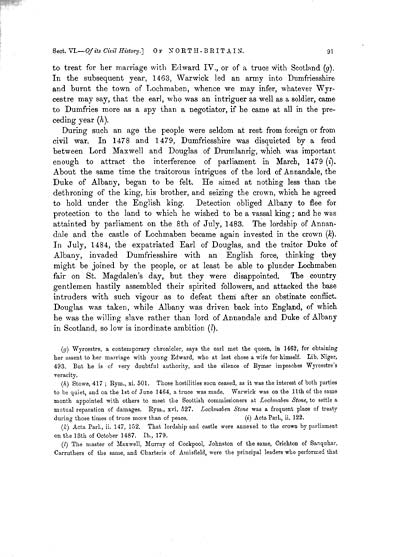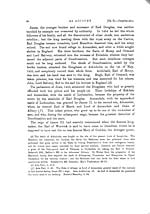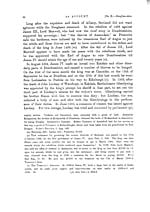Volume 5
(97) Page 91
Download files
Individual page:
Thumbnail gallery: Grid view | List view

91 to treat for her marriage with Edward IV., or of a truce with Scotland (g). In the subsequent year, 1463, Warwick led an army into Dumfriesshire and burnt the town of Lochmaben, whence we may infer, whatever Wyr- cestre may say, that the earl, who was an intriguer as well as a soldier, came to Dumfries more as a spy than a negotiator, if he came at all in the pre- ceding year (h). During such an age the people were seldom at rest from foreign or from civil war. In 1478 and 1479, Dumfriesshire was disquieted by a feud between Lord Maxwell and Douglas of Drumlanrig, which was important enough to attract the interference of parliament in March, 1479 (i). About the same time the traitorous intrigues of the lord of Annandale, the Duke of Albany, began to be felt. He aimed at nothing less than the dethroning of the king, his brother, and seizing the crown, which he agreed to hold under the English king. Detection obliged Albany to flee for protection to the land to which he wished to be a vassal king; and he was attainted by parliament on the 8th of July, 1483. The lordship of Annan- dale and the castle of Lochmaben became again invested in the crown (k). In July, 1484, the expatriated Earl of Douglas, and the traitor Duke of Albany, invaded Dumfriesshire with an English force, thinking they might be joined by the people, or at least be able to plunder Lochmaben fair on St. Magdalen's day, but they were disappointed. The country gentlemen hastily assembled their spirited followers, and attacked the base intruders with such vigour as to defeat them after an obstinate conflict. Douglas was taken, while Albany was driven back into England, of which he was the willing slave rather than lord of Annandale and Duke of Albany in Scotland, so low is inordinate ambition (l), (g) Wyrcestre, a contemporary chronicler, says the earl met the queen, in 1462, for obtaining her assent to her marriage with young Edward, who at last chose a wife for himself. Lib. Niger, 493. But he is of very doubtful authority, and the silence of Rymer impeaches Wyrcestre's veracity. (A) Stowe, 417 ; Rym., xi. 501. Those hostilities soon ceased, as it was the interest of both parties to be quiet, and on the 1st of June 1464, a truce was made. Warwick was on the 11th of the same month appointed with others to meet the Scottish commissioners at Lochmaben Stone, to settle a mutual reparation of damages. Rym., xvi. 527. Lochmaben Stone was a frequent place of treaty during those times of truce more than of peace. (i) Acta Parl., ii. 122. (k) Acta Parl., ii. 147, 152. That lordship and castle were annexed to the crown by parliament on the 13th of October 1487. Ib., 179. (l) The master of Maxwell, Murray of Cockpool, Johnston of the same, Crichton of Sanquhar, Carruthers of the same, and Charteris of Amisfield, were the principal leaders who performed that
Set display mode to:
![]() Universal Viewer |
Universal Viewer | ![]() Mirador |
Large image | Transcription
Mirador |
Large image | Transcription
Images and transcriptions on this page, including medium image downloads, may be used under the Creative Commons Attribution 4.0 International Licence unless otherwise stated. ![]()
| Caledonia, or, An account, historical and topographic of North Britain from the most ancient to the present times > Volume 5 > (97) Page 91 |
|---|
| Permanent URL | https://digital.nls.uk/74530318 |
|---|---|
| Description | Vol. V. |
|---|---|
| Attribution and copyright: |
|

